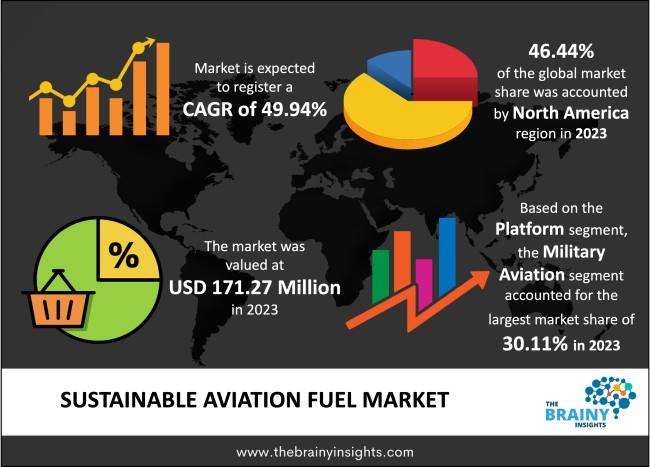
Market Introduction
The Sustainable Aviation Fuel (SAF) market is experiencing a remarkable transformation as global initiatives intensify to reduce carbon emissions in the aviation sector. SAF, produced from renewable biomass and waste resources, offers a viable alternative to traditional jet fuels, aligning with net-zero emission targets set by governments and international aviation bodies.
The global sustainable aviation fuel (SAF) market is projected to reach USD 9,837.25 million by 2033, growing at a robust CAGR of 49.94% from 2024 to 2033.
Market Dynamics
The market is being propelled by a combination of regulatory support, increasing environmental awareness, and growing airline commitments to sustainability. Government mandates, such as the European Union’s ReFuelEU Aviation initiative and incentives under the U.S. Inflation Reduction Act, are accelerating the development and adoption of SAF. Meanwhile, volatility in crude oil prices and a rising carbon tax landscape further bolster the economic appeal of SAF.
Regional Insights
- North America leads the market, driven by significant investments, favorable policies, and a robust aviation infrastructure.
- Europe follows closely with stringent environmental regulations and ambitious net-zero targets.
- Asia-Pacific is emerging rapidly, with nations like Japan, Singapore, and India investing in domestic SAF production to meet rising aviation demand.
- Middle East & Africa and Latin America are gradually entering the market with pilot projects and international collaborations.
Challenges and Opportunities
Despite its growth, the SAF market faces hurdles including high production costs, limited feedstock availability, and lack of widespread infrastructure. However, these challenges present opportunities for innovation in feedstock technologies, public-private partnerships, and supply chain optimization. Expanding production capacities and international policy alignment are critical to scaling up adoption globally.
Key Trends
- Increased airline and airport collaborations to establish SAF supply chains.
- Investment in advanced biofuel technologies such as Power-to-Liquid (PtL) and Alcohol-to-Jet (AtJ).
- Growing involvement of oil & gas companies transitioning to green energy solutions.
- Development of corporate SAF purchase agreements to reduce scope 3 emissions.
Key Players
The SAF market features a mix of established energy giants and specialized biofuel startups. Prominent players include:
- Neste
- World Energy
- LanzaJet
- Gevo Inc.
- Velocys
- SkyNRG
- BP
- Shell
- TotalEnergies
- Aemetis Inc.
These companies are investing in technology, infrastructure, and strategic alliances to gain a competitive edge in this rapidly evolving landscape.
Request to Download Sample Research Report- https://www.thebrainyinsights.com/enquiry/sample-request/12818
Conclusion
As the global aviation sector embraces sustainability, the Sustainable Aviation Fuel market is poised for exponential growth. With supportive policies, advancing technologies, and increasing stakeholder engagement, SAF is not only a solution to current environmental challenges but also a cornerstone for the future of aviation.
